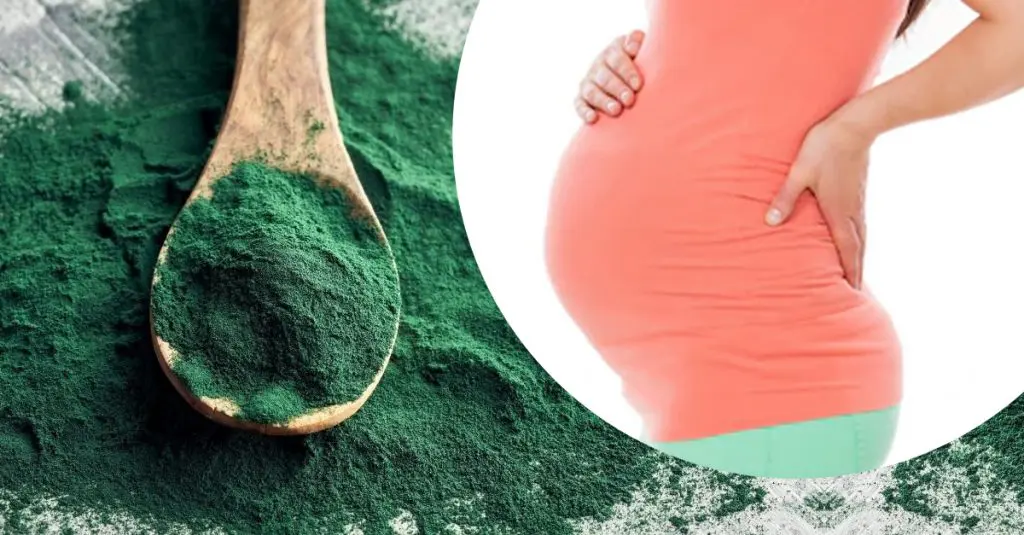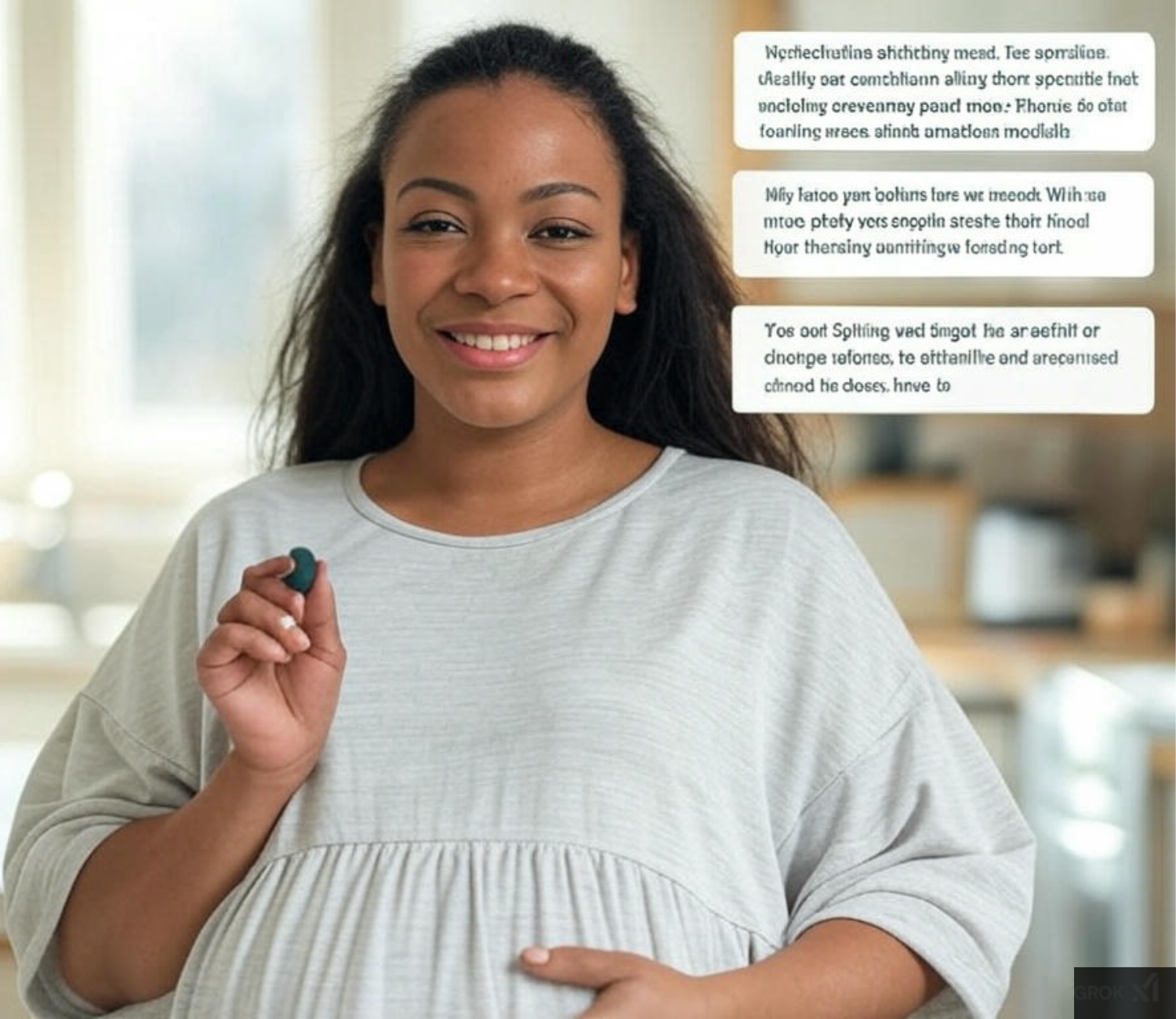Wondering, “Can I take spirulina while pregnant?” This friendly guide helps expecting moms navigate spirulina’s benefits and safety.
Pregnant women know that eating a healthy diet is a top priority, but it’s natural for expecting moms to worry about the safety and possible side effects of the foods they choose.
One superfood that often comes up in conversations about pregnancy nutrition is spirulina. If you’re asking, “Can I take spirulina while pregnant?” you’re not alone! It’s important to understand how spirulina and pregnancy connect, and why this nutrient-packed powerhouse is frequently recommended.
In this friendly guide, I’ll break down the nutritional value of spirulina, explore its benefits, and address any potential side effects. Drawing from scientific research and my experience as a former midwife, let’s find out if spirulina is a safe and smart choice for you during pregnancy and even breastfeeding!
So, what’s the deal with spirulina? This cyanobacteria—often called “algae” by mistake—is a nutritional goldmine. For years, people have turned to spirulina for its impressive lineup of nutrients, including iron, protein, vitamins, and essential minerals.
But when it comes to spirulina consumption during pregnancy and breastfeeding, is it safe? What benefits might it offer you and your baby-to-be? And why eat spirulina during pregnancy at all? Let’s dive into these questions and get the answers you need!
What Is Spirulina, Anyway?
If you’ve found yourself wondering, “Can I take spirulina while pregnant?” you might first be curious about what this mysterious superfood actually is. Let me break it down for you in a way that feels like a chat with a friend!
Spirulina is a type of cyanobacteria—don’t let that word intimidate you; it’s just a fancy term for a blue-green organism that grows in water. Often mistaken for algae, it’s been around forever and has earned its reputation as a nutritional superstar.
Packed with goodies like protein, iron, vitamins, and minerals, it’s no surprise people rave about it. But when you’re expecting, you want to be extra sure about what’s going into your body.
So, can I take spirulina while pregnant? As a former midwife and a fan of real, science-backed info, I’ll tell you this: spirulina’s nutrient density makes it intriguing, but safety is key. Stick with me as we explore what makes spirulina special and whether it’s a fit for your pregnancy journey!
The Nutritional Power Of Spirulina
When you’re pregnant, every bite counts, and that’s why spirulina’s nutritional punch might catch your eye. So, can I take spirulina while pregnant? Let’s talk about why this superfood has such a stellar reputation!
Spirulina is like nature’s multivitamin—loaded with protein, iron, B vitamins, and essential minerals like magnesium and potassium.
It’s even got antioxidants to boot, which help fight off those pesky free radicals. For expecting moms, the iron is a big deal since it supports healthy blood levels, something I saw firsthand as a midwife when moms needed that extra boost. Plus, the protein?
It’s a fantastic plant-based option to keep you and your growing baby strong. But here’s the thing: while its nutrient power is undeniable, the question “Can I take spirulina while pregnant?” still lingers. It’s packed with goodness, but we’ll dig deeper into safety and how it fits into your pregnancy diet—because you deserve to feel confident about every choice you make!

Is Spirulina Safe During Pregnancy?
If you’re asking, “Can I take spirulina while pregnant?” you’re probably hoping for a clear yes or no—but the truth is a little murkier. As a human writer and former midwife, I’ll give it to you straight: there’s not a ton of solid evidence to lean on.
“Experts don’t fully agree on spirulina’s safety during pregnancy because human studies are scarce,” explains Nicole Avena-Blanchard, PhD, an assistant professor of neuroscience at Mount Sinai Medical School and author of What to Eat When You’re Pregnant. Her advice? Chat with your doctor before diving in.
Some folks rave about spirulina’s nutritional perks—like its ability to support a healthy pregnancy and even lactation—thanks to its impressive lineup of nutrients.
We’re talking 11% of your daily Vitamin B1, 15% of B2, 21% of copper, and 11% of iron in just 7 grams, plus 4 grams of top-notch protein and healthy omega-3 and omega-6 fatty acids.
Sounds amazing, right? But here’s the catch: while animal studies look promising, the lack of extensive research on pregnant women leaves experts hesitant to call it 100% safe.
So, can I take spirulina while pregnant? It’s a maybe—not a hard no, but not a free pass either. Your best bet is to weigh the benefits with your doctor and decide what feels right for you and your little one!
Benefits Of Spirulina For You and Your Baby
Pregnancy is all about nourishing yourself and your little one, so naturally, you might be wondering, “Can I take spirulina while pregnant—and what’s in it for us?” As a human writer with a midwife’s heart, I’m excited to share why spirulina’s benefits have people buzzing!
This superfood is a nutrient dynamo, packed with iron to keep your energy up and your blood healthy—something every expecting mom can appreciate.
Then there’s the protein, a solid 4 grams per 7-gram serving, giving your baby the building blocks for growth while keeping you strong. Plus, those B vitamins (like 15% of your daily B2) and antioxidants? They’re like a little boost for your immune system and overall glow.
But it’s not just about you—your baby could benefit too! The omega-3 fatty acids in spirulina support brain and eye development, which I’ve seen matter so much to moms-to-be.
So, can I take spirulina while pregnant? While its perks—like aiding a hearty pregnancy—are tempting, safety isn’t fully proven yet. If your doctor gives the green light, spirulina might just be a powerhouse ally for you and your baby—bringing nutrition and peace of mind to your journey!
Possible Side Effects To Watch For
When you’re pregnant, you’re extra cautious about everything—and rightfully so! If you’re asking, “Can I take spirulina while pregnant?” it’s smart to consider not just the benefits but also any potential downsides.
As a human writer and former midwife, I’ve got your back with a friendly heads-up on what to watch for. Spirulina is generally well-tolerated, but some folks report mild side effects like tummy upset, nausea, or a bit of bloating—nothing too wild, but not exactly fun when you’re already navigating pregnancy quirks.
There’s also a rare chance of an allergic reaction, so if you’re new to spirulina, start small and see how you feel.
The bigger concern? Quality matters. If spirulina isn’t sourced properly, it could carry contaminants like heavy metals—something no expecting mom wants near her baby.
So, can I take spirulina while pregnant? It’s not a firm no, but these possible side effects mean you’ll want to chat with your doctor and stick to a trusted, high-quality brand. Stay safe and keep that mama intuition on high alert—you’ve got this!
Spirulina And Breastfeeding: What To Know
New moms often ask, “Can I take spirulina while pregnant?”—but what about after the baby arrives, during breastfeeding? As a human writer and former midwife, I’m here to shed light on why spirulina might be a game-changer in that post-pregnancy phase!
This blue-green microalgae is a nutritional rockstar, boasting 65% protein, antioxidants, and bioavailable iron—perfect for helping tired new moms bounce back.
That vibrant green hue? It’s thanks to chlorophyll, which helps detox your blood and gives your immune system a little love. Plus, with Vitamin B and anti-inflammatory goodies like GLA (Gamma Linolenic Acid) and essential amino acids, it’s a powerhouse for recovery.
For breastfeeding moms, spirulina’s benefits shine even brighter. Its iron can fight off anemia—a common postpartum struggle—without the constipation that some supplements bring. And those nutrients?
They might just enrich your milk, supporting your baby’s growth too. But here’s the catch: just like during pregnancy, the question
“Can I take spirulina while pregnant or breastfeeding?” doesn’t have a slam-dunk answer yet due to limited human studies.
It’s safe for most, but chat with your doctor to ensure it’s right for you and your nursing journey—because you deserve to feel amazing while nourishing your little one!

Why Pregnant Moms Love This Superfood
Pregnancy is a whirlwind time when your body’s working overtime to nurture your little one, making nutrition a top priority. If you’re wondering, “Can I take spirulina while pregnant?” you’re on the right track to explore this nutrient-packed gem!
As a human writer and former midwife, I’ve seen how spirulina’s lineup—think proteins, iron, B vitamins, trace elements, and antioxidants—can be a game-changer. It’s like a natural support system, helping you dodge fatigue and deficiencies while boosting healthy fetal development.
Adding spirulina to your diet doesn’t have to be tricky! Start small with a tablet or mix a teaspoon of powder into a smoothie—pair it with fruit to keep it tasty.
It’s a fuss-free way to get that nutritional edge when your needs are sky-high. But here’s the scoop: “Can I take spirulina while pregnant?” isn’t a one-size-fits-all answer. Its benefits for a healthy pregnancy are exciting, but with safety studies still limited, a quick chat with your doctor is the best way to make it work for you. Keep it simple, keep it safe, and enjoy the boost!
Tips For Adding Spirulina To Your Diet
Pregnancy ramps up your nutritional needs, and if you’re asking, “Can I take spirulina while pregnant?” you’re probably curious about how to sneak this superfood into your routine.
As a human writer and former midwife, I’m here to share some easy, mom-friendly tips! Spirulina’s loaded with goodies—iron, protein, vitamins, and antioxidants—that can help you stay energized and support your baby’s growth. But how do you make it work?
Try starting with a tablet for simplicity—perfect for busy days when you’re juggling a million things. Or, blend a teaspoon of spirulina powder into a smoothie with banana and berries to mask its earthy vibe.
You could even sprinkle it over yogurt for a quick snack! The key is to keep it low-key and fun. Still, the question lingers: “Can I take spirulina while pregnant?” While it’s a nutritional champ, safety isn’t fully locked down yet—so check with your doctor first. With their okay, these tips can help you enjoy spirulina’s perks, stress-free, all pregnancy long!
The Bottom Line
Wondering, “Can I take spirulina while pregnant?” You’re in good company! This cyanobacteria—often miscalled algae—is a nutrient goldmine, bursting with iron, protein, and vitamins.
Pregnant moms love its energy boost and baby-nourishing potential, backed by my midwife experience and research.
But here’s the catch: while it’s a hit for malnourished folks and non-pregnant folks alike, human studies on pregnancy safety are thin. Animal tests hint at benefits, yet experts hesitate. So, can I take spirulina while pregnant? Maybe—but chat with your doctor first to keep you and your little one thriving!
FAQ
What is spirulina?
Spirulina is a nutrient-rich cyanobacteria, often called algae, packed with protein and vitamins.
Can I take spirulina while pregnant?
It’s not fully proven safe due to limited human studies.
Talk to your doctor before trying it!
What nutrients does spirulina have?
It’s loaded with iron, protein, B vitamins, and antioxidants.
Great for energy and overall health!
Is spirulina safe for my baby?
We don’t know for sure since research is lacking.
Check with your doctor to be safe.
What are the benefits of spirulina in pregnancy?
It may boost energy and support baby’s growth.
Think iron and protein power!
Are there side effects of spirulina?
Some feel nausea or bloating; quality matters too.
Poor sources might have contaminants.
Can spirulina help with pregnancy fatigue?
Its iron and protein might give you a lift.
But safety first—ask your doc!
How do I take spirulina while pregnant?
Try tablets or mix powder in smoothies—if approved.
Start small and keep it simple!

